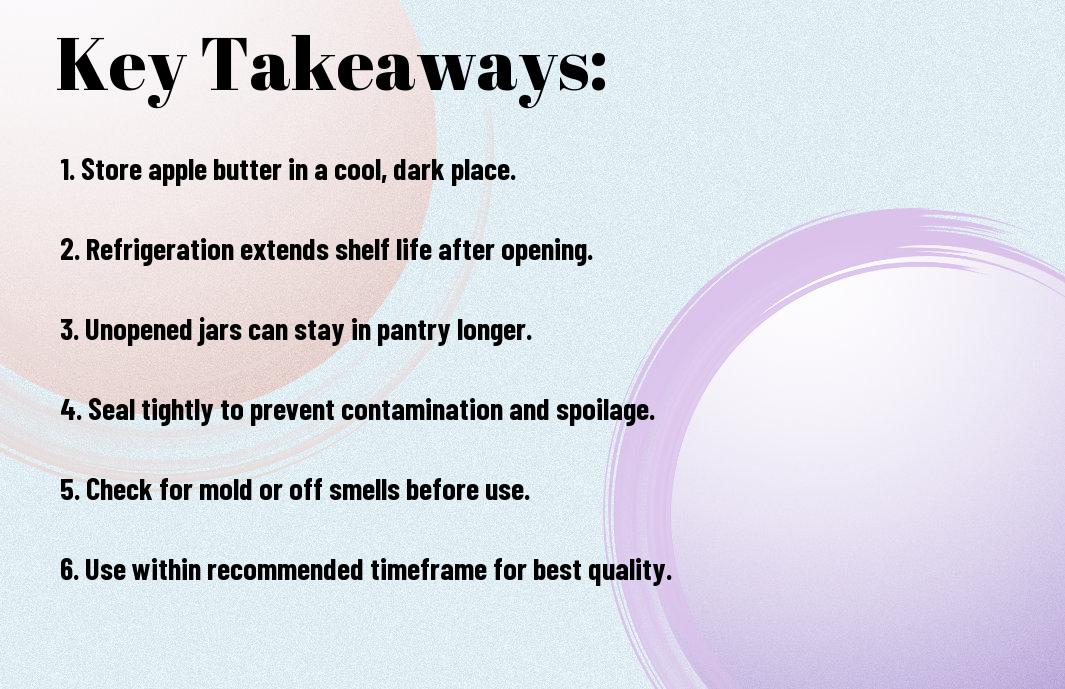Just like any delicious spread, understanding how to properly store apple butter can greatly impact its flavor and safety. You should always check the label for specific instructions, as homemade versions may have different guidelines than store-bought. When unopened, apple butter can be stored in a pantry, but once you break the seal, refrigerating is the best option to prolong its freshness and avoid spoilage. In this post, we’ll explore effective storage tips to keep your apple butter tasty and safe for your next breakfast or snack.
Key Takeaways:
- Apple butter can be stored unrefrigerated for a short period if it’s unopened, but refrigeration is recommended after opening to extend its shelf life.
- When storing apple butter, always check for signs of spoilage such as off smells or mold; discarding any questionable jars ensures safety.
- For longer storage, apple butter can be frozen in airtight containers, allowing you to enjoy it for months beyond its typical shelf life.
Understanding Apple Butter
Before entering into storage tips, it’s important to understand what apple butter is. Apple butter is a rich, concentrated spread made primarily from apples, sugar, and spices, typically cooked down to a smooth, thick consistency. This delightful condiment is often enjoyed on toast, pancakes, or even as an ingredient in various recipes, highlighting the natural sweetness and flavor of apples.
What is Apple Butter?
Between a jam and a sauce, apple butter is a deliciously sweet spread that captures the essence of apples. It’s created by simmering apples with sugar and spices until they become thick and dark in color, resulting in a smooth, velvety texture that is different from traditional apple sauce.
Nutritional Benefits of Apple Butter
At first glance, you might think of apple butter as just a tasty treat, but it offers several nutritional benefits as well. Packed with vitamins such as vitamin C and antioxidants, apple butter can be a part of your healthy diet. Additionally, it is generally lower in fat than many other spreads, making it a guilt-free indulgence.
Understanding the nutritional benefits of apple butter can encourage you to incorporate it into your diet. In moderation, this spread can provide fiber from apples, promoting digestive health. With its rich flavor, you’ll likely find yourself using less compared to sugary alternatives. Be aware that while it is lower in fat, the sugar content can be significant, so always check the label for a better insight into its caloric impact.

Best Storage Practices
It is vital to follow proper storage practices to keep your apple butter fresh and flavorful. Whether you choose to refrigerate or store it at room temperature, the right containers and sealing methods can make a significant difference in the longevity and quality of your apple butter.
Room Temperature vs. Refrigeration
Refrigeration helps extend shelf life, while room temperature storage is suitable for short-term use.
Storage Method
| Room Temperature | Use for unopened apple butter; store in a cool, dark place. |
| Refrigeration | Recommended for opened jars to maintain freshness. |
Containers and Sealing Methods
After opening your apple butter, proper containers and sealing methods are vital to maintain its quality. Use airtight jars or containers to protect against moisture and contaminants.
Consequently, choose glass or plastic containers that are specifically designed for food storage. Airtight seals prevent air and moisture from spoiling your product, while proper labeling with dates ensures you keep track of freshness. Avoid using damaged or mismatched lids, as they can compromise the seal. Always store your apple butter in a cool, dry place to prolong its shelf life and maintain its delicious taste.

Shelf Life of Apple Butter
All types of apple butter have a varying shelf life depending on their preparation and storage conditions. When properly sealed and stored in a cool, dark place, unopened jars can last up to two years. Once you open a jar, however, the shelf life shortens significantly, typically lasting only 1 to 3 weeks in the refrigerator. Understanding these timeframes helps you maintain the quality and safety of your delicious apple butter.
Unopened vs. Opened Jars
Along with proper storage, the shelf life of your apple butter largely depends on whether the jars are unopened or opened. Unopened jars, when kept in a cool, dry place, can last up to two years, while opened jars need to be refrigerated and consumed within a few weeks for optimal taste and safety.
Signs of Spoilage
At times, you may encounter signs that indicate your apple butter has spoilage. Look for common indicators like an off smell, mold growth, or an unusual change in color or texture. These signs are necessary for determining whether your apple butter is still safe to consume.
Even if the apple butter appears fine, you should take the signs of spoilage seriously. If you notice any mold growth, a strange smell, or an unexpected change in color or texture, it’s best to err on the side of caution and discard the jar. Consuming spoiled apple butter can lead to foodborne illnesses, which may cause uncomfortable symptoms. Always trust your senses and prioritize your health and safety when it’s time to enjoy your apple butter.
Refrigeration Considerations
To ensure your apple butter stays fresh and flavorful, it’s vital to consider the benefits and drawbacks of refrigeration. While refrigeration can extend the shelf life of your apple butter, it may also alter its texture and taste. Ultimately, the choice to refrigerate hinges on your personal preferences and how soon you plan to consume your apple butter.
Advantages of Refrigerating Apple Butter
Along with preserving the freshness of your apple butter, refrigeration can help inhibit the growth of bacteria and mold, making it safer for consumption. By storing your apple butter in the fridge, you can enjoy its rich flavor for a more extended period, especially if you don’t plan to use it quickly. Additionally, a chilled apple butter can provide a refreshing contrast when spread on bread or toast.
Disadvantages of Refrigerating Apple Butter
Among the downsides of refrigerating your apple butter is the potential alteration of its texture. When stored in the fridge, it may become thicker and less spreadable, making it harder to use. Furthermore, refrigeration can sometimes mute the flavors, preventing you from enjoying the full, rich essence of the apple butter you love.
At the same time, if you choose to refrigerate your apple butter, be prepared for some changes. The cold environment can cause it to become dense and hard to spread. If you prefer your apple butter at room temperature, you may need to take it out of the fridge and let it sit for a while before use. Additionally, frequent temperature changes can impact its flavor profile, leading to a less enjoyable experience. Keeping these points in mind will help you make an informed decision on whether to refrigerate your apple butter.
Freezing Apple Butter
Keep your apple butter fresh for months by freezing it. The cold temperature halts the growth of bacteria and preserves flavor, allowing you to enjoy your homemade or store-bought apple butter long after it’s been opened. Just be sure to use proper freezing techniques to maintain its rich taste and smooth texture.
How to Freeze Apple Butter
Before freezing your apple butter, make sure it’s completely cooled. Then, portion it into airtight containers or freezer bags, leaving some space for expansion. Seal tightly, label with the date, and place them in the freezer. This way, you’ll have convenient servings ready whenever you’re craving that delicious spread.
Thawing and Using Frozen Apple Butter
Freezing your apple butter is just the first step; thawing it properly is imperative for preserving taste and texture. Move the portions to the refrigerator for overnight thawing, or defrost in the microwave on a low setting if you’re in a hurry. Avoid refreezing once thawed, as this can compromise quality.
Using thawed apple butter is simple and delicious! Spread it on your favorite bread, mix it into oatmeal, or use it in baking recipes where you’d normally use jams or fruit spreads. Just keep in mind that if your apple butter shows any signs of ice crystals or a strange odor, it’s safest to discard it. Enjoy your apple butter within a few weeks once thawed for the best flavor experience!

Frequently Asked Questions
Unlike many other preserves, apple butter can present unique storage challenges. You might be wondering what the best methods are for keeping your apple butter fresh for longer periods, as well as other common queries regarding its storage and usage.
Can I store apple butter in the pantry?
At room temperature, apple butter can be stored in a cool, dark pantry for a limited time, especially if it is unopened. However, once opened, it’s best to refrigerate your apple butter to prevent spoilage and to maintain optimal flavor and quality.
How can I extend the shelf life of apple butter?
Against the odds of spoilage, you can take steps to extend the shelf life of your apple butter. Proper sterilization of jars, ensuring airtight sealing, and keeping your preserve in a consistently cool environment will all help in prolonging its longevity.
Butter can last longer if you take proper precautions. Make sure to use sterilized jars for canning, as they minimize exposure to contaminants. Keeping your apple butter in a dark and cool environment will also aid in preventing spoilage. Additionally, consider adding citric acid or adjusting the sugar content to further enhance preservation. Always check for any changes in color, smell, or texture before consumption, as these could indicate that your apple butter has gone bad.
Final Words
Now that you understand the best practices for storing apple butter, you can ensure your homemade or store-bought jar stays fresh for as long as possible. By refrigerating your apple butter, you extend its shelf life and preserve its delicious flavor. Always pay attention to storage tips, such as keeping it sealed tightly and checking for changes in color or texture. You’ll enjoy your apple butter at its best when you take these steps into account.
FAQ
Q: Should I refrigerate apple butter after opening?
A: Yes, it is advisable to refrigerate apple butter once you have opened the jar. This helps preserve its flavor and prevents spoilage. The cool temperature of the refrigerator slows down the growth of bacteria and mold, ensuring your apple butter stays fresh for a longer period.
Q: How long can I store apple butter in the refrigerator?
A: Opened apple butter can typically be stored in the refrigerator for about 1 to 3 months. However, for the best quality, it’s recommended to consume it within 1 month. Always check for any signs of spoilage, such as off odors or mold, before using it.
Q: Can I store apple butter at room temperature?
A: Unopened apple butter can be kept at room temperature in a cool, dark place, like a pantry. However, once opened, it’s best to refrigerate it. Leaving opened apple butter at room temperature can shorten its shelf life and compromise its safety.
Q: What are the signs that apple butter has gone bad?
A: Signs that apple butter may have spoiled include an off smell, mold growth on the surface, or a change in texture. If you notice any of these signs, it’s best to discard the apple butter to avoid potential health risks.
Q: Can I freeze apple butter for longer storage?
A: Yes, you can freeze apple butter to extend its shelf life. It can last for up to a year in the freezer if stored in an airtight container or freezer bag. Make sure to leave some space at the top of the container to allow for expansion as it freezes. To use, simply thaw it in the refrigerator before consuming.
